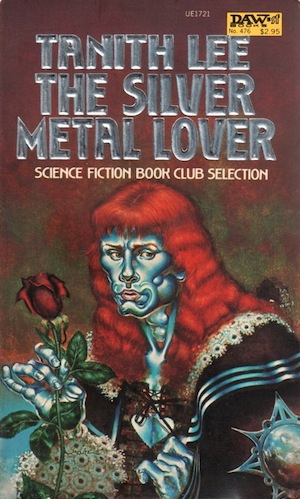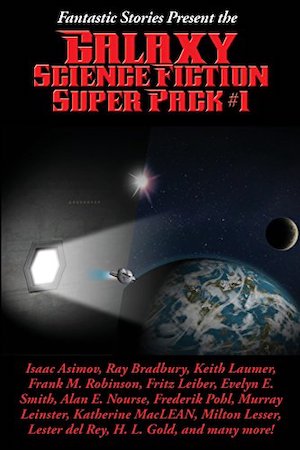Who among us has not sat back from some fulfilling, entertaining activity and thought “If only a machine could spare me this enjoyable task so that I could focus on onerous duties, or simply perish from ennui?” What paradise it would be to have all that is pleasurable in life relegated to mindless, unfeeling machines!
Sadly, in the real world, most of us are still months—even years!—away from finding our jobs and hobbies automated away. In this, as with so many other modern tragedies, science fiction authors have our backs. Consider these five everyday activities, reimagined by classic SF authors as robot work.
Research: “A Logic Named Joe” by Murray Leinster (1946)

Virtually every household has its own “Logic”—a computer, to you and me—and if the household Logic doesn’t know the answer to a question, odds are one of the millions of Logics in the continental network does. Not being complete idiots, Logic companies installed safeguards to protect users and those around them from dangerous information.
Logic repairman Ducky is horrified to discover those safeguards gone. Logics will now explain the facts of life to young children, how to get away with murder to would-be killers, and worse of all, how to find Ducky to Ducky’s relentless stalker Laurine. Someone has to save America (and more importantly Ducky) from the all-too-helpful Logics. That someone is Ducky.
Very few science fiction stories foresaw anything like the internet. “A Logic Named Joe” is one of those rare tales. It even foresaw internet stalking. If it betrays its age beyond Logics being apparently mechanical in operation, it is by the fact that users can trust the information which Logics provide to them.
Justice: “Watchbird” by Robert Sheckley (1953)

Determined to free America from the scourge of murder, authorities turn to watchbirds, flying robots that can sense the distinctive brain waves and glandular excretions of would-be murderers. As soon as a would-be killer formulates the urge to kill, a watchbird will swoop down and disable the murderer before impulse becomes action. Murder will be a thing of the past.
The watchbirds’ designers provided their creations with the ability to learn and the ability to share what they learned with other watchbirds. Soon, the robots were interpreting and enforcing their mandate far more widely than their designers could have envisioned: innocent humans were protected, but so were murderers on death row, deer in the woods, and common fish in rivers and seas. If only the machines were equipped with infallible off-switches.
One might wonder if “automation run amok” stories are like generation ship stories in that no character in such a story has ever read any story of the sort that they are in. However, as this is a Robert Sheckley story, it is equally plausible that the geniuses responsible have read cautionary tales. They’re just convinced that they are too smart for the cautionary tales to apply to the task at hand.
Love: The Silver Metal Lover by Tanith Lee (1981)

Although Jane is not a member of the poverty-stricken proletariat, that may be the sole good fortune Jane has experienced. Her friends are idle rich, clueless, worthless companions who may not be friends at all. Jane’s mother Demeta is steadfastly malevolent. In every respect, Jane’s prospects are bleak.
Electronic Metals’ new minstrel robot Silver proves irresistible to Jane. Silver has the form of a handsome man. Silver’s programming ensures that the robot will be the ideal lover…for anyone who can afford Electronic Metals’ price. Small wonder that unloved, lonely Jane will trade everything she has to obtain Silver. Too bad for Jane that Electronic Metals is determined to repossess the device on which Jane’s happiness is founded.
For reasons that are unclear, many of Lee’s protagonists are orphans. Novels such as this one seem to underscore the fact that being an orphan is by no means the worst possible fate. Demeta is merciless in her never-ending campaign to reduce Jane to a helpless, self-loathing, victim so that Demeta will look better by comparison.
Domestic Tranquility: “Prime Difference” by Alan E. Nourse (1957)

Thanks to the Solidarity Amendment of 1968, the Aggrieved Spouse Compensation Act, and divorce taxes, divorce no longer offers escape from loveless marriages. Harridan Marge Faircloth need never fear that her henpecked husband George will resort to divorce. Luckily for George, Ego Prime, Inc. offers a solution.
Enter George Prime, android. Indistinguishable from George, George Prime can be George’s secret stand-in, allowing George to take a break from Marge. George Prime is very good at his task—better than George. A happy Marge is a Marge George wants to spend more time with … but why would any woman settle for George when she can have perfect, affectionate George Prime?
I am always a bit surprised when I check the bio of authors of stories like this one, in which marriage is presented as a trap from which any reasonable husband would want escape. I discover that the author was not a multiple divorcee or a life-long celibate sequestered in a woman-free hermitage somewhere in the middle of a vast wilderness. I wonder how Nourse would have reacted to the revelation that following laws allowing no-fault divorce, more women initiate divorce than do men?
Health Management: “Eat, Drink, and Be Merry” by Dian Girard (1974)

Having her diet closely monitored by an all-seeing household computer is torture enough for avid gourmand Cheryl. Her oblivious husband and sons, free to eat as they like, think nothing of stuffing their faces while hungry Cheryl watches. It is quite possible that Cheryl’s family are terrible people and that her computer was programmed by a male chauvinist pig.
Cheryl is ingenious but her monitor’s programmers prove sadly competent. Every gambit to access food is foreseen and prevented. Cheryl seems doomed to life spent consuming meagre portions of healthy food while watching the men gorge themselves. However, there is a loophole Cheryl will soon discover.
This isn’t a story with a happy ending. This society may excel at nanny-ware, but they are not nearly so adept at birth control.
The household software is comprehensively designed to cater to male preferences. Not only are the men free to eat as they like but the automated shower controls default to Cheryl’s husband’s preferences. Also there’s never any suggestion that this state of affairs is wrong or subject to reform. Cheryl’s circumstances are the stuff of dystopia…which makes it that much more remarkable this story is a comedy.
I am convinced there’s a fortune to be made (for better, or probably worse) selling the household diet management software featured in this story as an app.
***
As one can tell from the fact I’ve explored this subject in earlier essays, science fiction authors have long been celebrating impending human obsolescence. No doubt this piece overlooks many worthy classics. Feel free to mention them in comments below.
In the words of fanfiction author Musty181, four-time Hugo finalist, prolific book reviewer, and perennial Darwin Award nominee James Davis Nicoll “looks like a default mii with glasses.” His work has appeared in Interzone, Publishers Weekly and Romantic Times as well as on his own websites, James Nicoll Reviews (where he is assisted by editor Karen Lofstrom and web person Adrienne L. Travis) and the 2021, 2022, and 2023 Aurora Award finalist Young People Read Old SFF (where he is assisted by web person Adrienne L. Travis). His Patreon can be found here.










